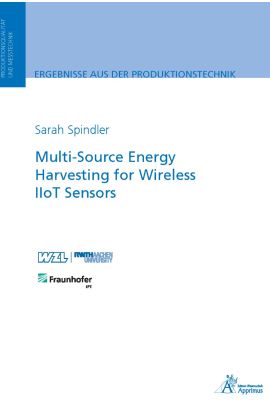The Industrial Internet of Things (IIoT) and Industry 4.0 are accelerating the spread of wireless sensors in production, which are used to digitize process, machine, and environmental data. However, the limited operating time due to battery operation is still an obstacle to the widespread use and acceptance of wireless IIoT sensor technology. Multi-source energy harvesting (MSEH) is a possible solution to the energy supply problem of wireless IIoT sensors. A universal MSEH Power Management Board tailored to industry and application examples for industrial scenarios are required for realization.
The MSEH power management board InduFlex developed in this thesis is based on a multiple input multiple output architecture. The design of InduFlex considers the requirement categories of flexibility, performance, reliability, economy, and usability and includes the analysis of the implementation framework and the operating conditions of solar, thermal, and vibration harvesters in the industrial environment. The InduFlex prototype was validated in eight different system context scenarios and three real industrial applications: a milling process, a metal forming process, and an environmental monitoring process in a biolaboratory. Light and vibration were the most promising energy sources. Based on the potential energy supply through MSEH in the applications, exemplary IIoT systems were selected, and the energy balance was calculated. The energy self-sufficient and supporting areas were shown for the required solar cell size depending on the sampling and transmission rate.
Overall, the investigations show that the application of MSEH is significantly simplified by a flexible, universal power management board. However, the general use of energy harvesting is severely limited in terms of location and available energy due to the great dependence on the available environmental sources. As the application and, therefore, the IIoT sensor technology is the main focus, alternative energy supply solutions, must be sought if the supply from MSEH is insufficient. MSEH is not a universal solution to the energy supply problem of wireless IIoT sensor technology. Nevertheless, the potential of energy harvesting should also be evaluated when using wireless IIoT sensor technology, as there are specific areas of application and exceptional cases in which a ‘deploy and forget’ approach can be realized, or at least the operating time can be significantly extended.
| Autor | Spindler, Sarah |
|---|---|
| Gewicht | 0.247 kg |
| Erscheinungsdatum | 02.06.2025 |
Produktionsqualität und Messtechnik
Multi-Source Energy Harvesting for Wireless IIoT Sensors
Kurzbeschreibung
Wireless Industrial Internet of Things (IIoT) sensors support industrial digitalization but face adoption barriers due to limited battery life. Multi-source energy harvesting (MSEH) offers a potential solution. This thesis develops, tests, and validates a universal, flexible, and industry-ready power management board for vibration, thermal, and solar sources, to investigate whether MSEH can serve as a universal energy solution for wireless sensor deployment in industrial environments.

